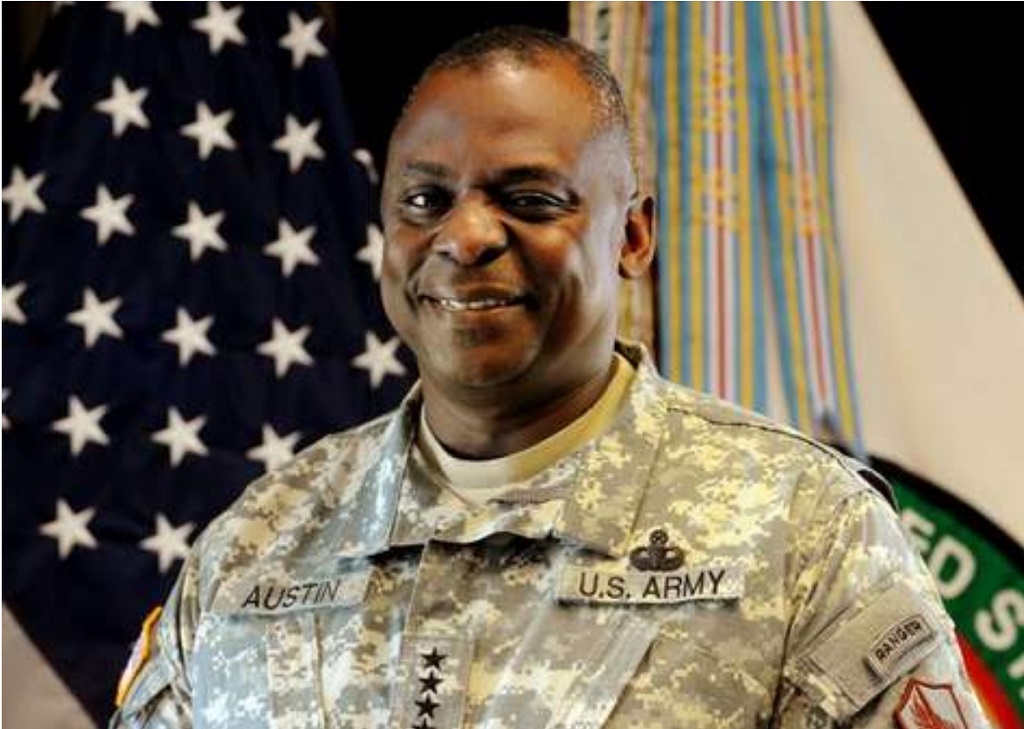Military

Army Gen. Lloyd Austin III, who took command of U.S. Central Command in March, oversees U.S. military operations in one of the world’s most volatile regions, encompassing most of the Middle East and Southwest Asia.
Austin, 60, served as the Centcom chief of staff from September 2005 until November 2006, oversaw the withdrawal of U.S. forces from Iraq in December 2011 and then served as Army vice chief of staff before taking command at Centcom. Monday morning, he sat down in his office at MacDill Air Force Base with his wife, Charlene, for his first interview as the head of Centcom. Some of the questions and responses have been edited for space.
QUESTION: People are always curious how the commander and his family will engage with the community. What are some of your thoughts and plans?
Gen. Austin: It is a wonderful community. We are really happy to be back and part of it. I think Centcom, of all the commands in the inventory, this is the place I’ve always wanted to come back to. As you look at my tempo here … my time is very limited. While I am here, I certainly have enjoyed interacting with the leadership in Tampa and look forward to doing as much as I can.
Charlene Austin: I feel as though I am on a continuum where wonderful things are going on for our soldiers and families and it’s been that unwavering support that has been so exciting for me. I look forward to being a part of the organizations and groups that are doing things for our soldiers and families.
Q: Any that particularly stand out?
Charlene Austin: For me, it will probably be the United Way, because I know a lot of the organizations our families are utilizing fall under the United Way. Probably the USO. There may be some work continuing with Operation Homefront. I am currently a member of the Military Child Education Coalition, in the education arena and probably doing some things there, in addition to helping wounded warriors and Gold Star families.
Q: Secretary of Defense Chuck Hagel has talked about a 20 percent reduction in the headquarters of the combatant commands like Centcom, which has already planned to cut staff by more than that to about 3,500. How will this affect Centcom moving forward?
Gen. Austin: I think as things slow down a bit as we come out of Afghanistan, one of the things that we would naturally do is take a look at our organization and make sure we had it about right. We are never going to have more people on board than we need, but always look to have just what we need to get the job done. As the (Department of Defense) reduces its headquarters by 20 percent across the board, we will be part of that. But again, we will ensure we have what is necessary to get the job done.
Q: Is it too early to talk about hard numbers?
A: It is.
Q: There has been talk about realigning the combatant commands and stripping Afghanistan and Pakistan from Centcom and moving them to Pacific Command to be closer aligned with India. Is that something that is on your radar screen?
A: In terms of what recommendations are out there and whether they are the right recommendations, Howard, I won’t even endeavor to speculate.
Q: Has it even reached your level yet?
A: Ah , no.
Q: How important is the region?
A: The Middle East is one of the most complex and volatile regions of the world. It’s also one of the most important because we have a number of vital interests there, to include the free flow of resources through key shipping lanes, most notably the Strait of Hormuz; defense of our homeland against the threat of terrorism and extremism; and, the prevention of proliferation of weapons of mass destruction. That is why it’s so critical that we remain present and engaged, because we recognize that any kind of instability in that part of the world can have significant impacts on, not only the region, but the global economy and security situation.
Q: How are events in Egypt affecting Centcom’s mission?
A: The issue in Egypt is obviously a very tough issue and certainly one our government remains focused on. Egypt is an important country to us. It has a peace treaty with Israel. It controls the Suez Canal. We have traditionally enjoyed overflight rights and look to do so going into the future. We’ve also enjoyed a great military-to-military relationship with Egypt in the past. I think that relationship has enabled us to do things to help promote stability and security in the region. I think maintaining that relationship going forward will probably help to get Egypt back on a track that where we can see greater civilian control, move to elections in the near-term and hopefully see them reform their constitution, which is what they are trying to do.
Q: How surprising is it to see the violent reaction to the pro-Mohamed Morsi protestors?
A: The way things have evolved, everyone has been disappointed that we’ve seen the minister of the interior use force against civilians and violence break out. Exactly who made the call to do what, at what point in time, that is left to be determined.
Q: Talk about the progress in Afghanistan and plans for what happens there after 2014.
A: As you look at the Afghan security forces, I think we have every reason to be encouraged. Look at where we are now. We have developed a number of corps. A special operations force that’s fairly capable. The senior leadership in the Afghan security forces, I think, are doing a pretty good job. … As you look at security forces, there is reason for optimism, but that’s only one component of what will be required for security and stability going forward. … We have to see fair and free elections and then there has to be a transition of power. And so we are hopeful that things happen there as well. Then I think leadership has to go after corruption, which has been an issue in the past and will continue being an issue going forward. If we can have some good results with elections and leadership goes after corruption, I think the country will continue to move forward.
Q: Can you share your thoughts on troop levels post-2014, when President Barack Obama has said nearly all U.S. combat troops will leave Afghanistan?
A: Any recommendation I would make for the president, I would reserve for the president. I would not make those public. As you know, our leadership is still in the process of deciding what the post-2014 footprint will be. A number of things, obviously, go into the equation. One of them is a bilateral security agreement. In order for us to stay there, we need one. I am optimistic we will get a bilateral security agreement. As I talk to people in that country, everyone I talk to thinks it is necessary. … But if you don’t have that, as was the case in Iraq, then we can’t keep troops there. I would not want to speculate on what the enduring presence would be. But you have heard our leadership say we are committed to a long term relationship with the country of Afghanistan.
Q: How confident are you that a level of stability can return to Iraq?
A: What we are seeing in Iraq today is obviously very concerning. The level of violence is beginning to approach what we saw back in the trouble days in Iraq and everyone is concerned about that. The good news is that, thus far, we’ve not seen a Shia response to this work that is principally the work of al-Qaida in terms of the bombings and violence. It has not devolved into sectarian activity at this point. If it does, then that will be very troubling. To your point, I think there’s clearly the opportunity to reverse the trends if the security forces do the right things and focus on the right things and if the political leadership reaches out and embraces the Sunni community.
Q: What should or shouldn’t be done in Syria?
A: This represents the most challenging and complex situation I’ve seen in my 38-year military career. And, it’s complex, in part, because it’s a civil war, not based on ideology, but rather based on ethno-sectarian issues. And, the situation is further compounded by proxy activity and the possible use of chemical weapons. As such, there is no singular military solution to the problem. It’s going to require a diplomatic or political solution, and that’s being worked hard by folks in Washington, D.C., and elsewhere. Our job, my job — is to make sure we have a range of military options available to support whatever policy decisions are made by our civilian leadership. And, we are prepared; and, certainly we can and are doing things to help alleviate the human suffering, particularly as it pertains to the refugee crisis. But, while there’s understandably a desire to do something to help bring an end to the fighting, before we take any kind of action, we need to make sure we have well-defined objectives, the means and resources to achieve those objectives, and some degree of certainty that our efforts will make the situation better not worse.
Q: What should Centcom’s approach be toward Iran?
A: Centcom’s approach to Iran has always been watchful and guarded and it has not changed and will not change going forward into the future. If you look at many of things troubling throughout the region, you find Iran involved in a lot of it. In Syria, there has been clear information of Iranian involvement there. And a lot of other places in the region. The other troubling piece with Iran is their apparent pursuit of nuclear weapons. The President has been clear what our policy is, a policy of prevention, so we would hope that we are able to solve this diplomatically. If not, then he’s also been clear that all options are on the table.
Q: How much does the lack of peace between the Israelis and Palestinians add to your job at Centcom?
A: As you talk to the leaders throughout the region, the Arab-Israeli tension issue is to them — to many of them — it’s fundamental to many of the other issues. And so there are many people who believe if that moves forward, then things can improve throughout the region.
Q: Are you surprised by the resilience of al-Qaida?
A: I am not. We know al-Qaida is not just people. It’s an idea and I think that we have to account for that as we go about our business throughout the region. We have had good effects against core al-Qaida, but we are seeing activity from al-Qaida franchises throughout the region and North Africa. And so it is an idea and you have to do things to account for that. But you also have to go after the conditions that allow for that idea to flourish. I think working all three of those things; the people who are actors, countering ideas and working on conditions that allow the idea to flourish is really how we are going to get after this and make things better.

Original URL: http://tbo.com/list/military-news/new-centcom-commander-on-troops-cuts-reductions-middle-east-20130819/

